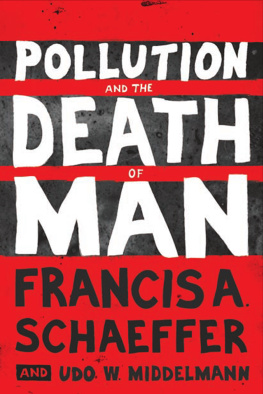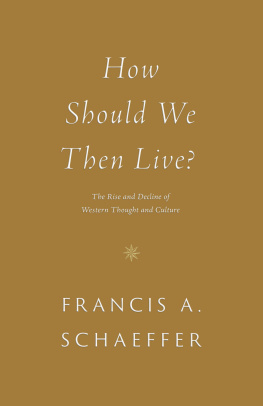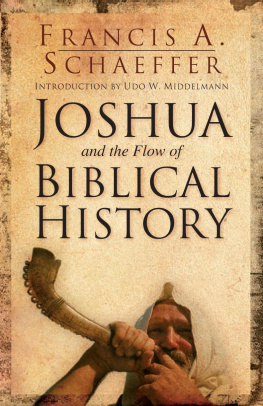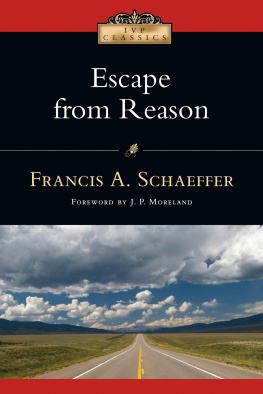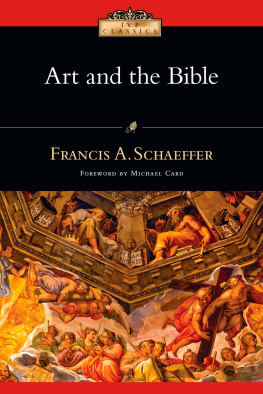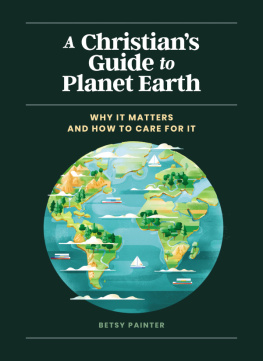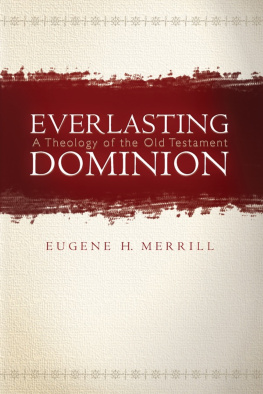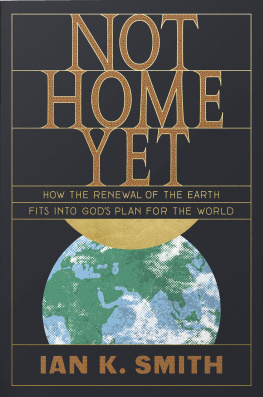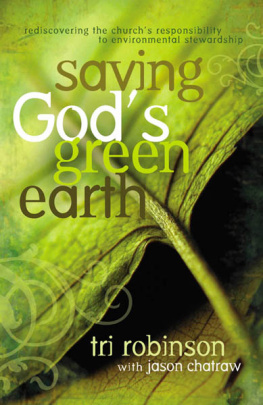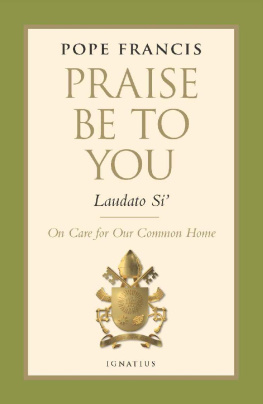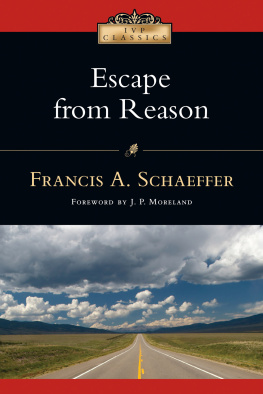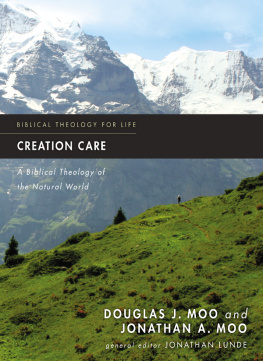Copyright 1970 by Francis A. Schaeffer; originally
published by Tyndale House, Wheaton, Illinois.
All rights reserved. No part of this publication may be reproduced, stored in a retrieval system or transmitted in any form by any means, electronic, mechanical, photocopy, recording or otherwise, without the prior permission of the publisher, except as provided by USA copyright law.
Cover design: Dual Identity inc.
First printing 1992
Reprinted with new cover 2011
Printed in the United States of America
Trade Paperback ISBN: 978-1-4335-1947-5
Library of Congress Number 92-74125
CONTENTS
1 What Have They Done to Our
Fair Sister? 7
2 Pantheism: Man Is No More Than
the Grass 15
One
What Have They
Done to Our
Fair Sister?
S ome time ago when I was in Bermuda for a lecture, I was invited to visit the work of a young man well-known in the area ofecology. His name was David B. Wingate. He was especially known for his efforts to save the cahow bird from extinction. The cahow is a little larger than a pigeon and breeds only on a very few islands near Bermuda, just off the main island. Wingate struggled for many years to increase the number of these birds.
As we went around visiting the nests, we were talking together about the whole problem of ecology. He told me that he was losing ground in his battle, because the chicks were not hatching in the same proportion as before. If they had continued at the previous rate, he would have been well on his way to success. Instead, he found that fewer and fewer were hatching. What was the reason? To find out, he took an embryo chick from the egg and dissected it. Its tissues were found to be filled with DDT. Wingate was convinced that this accounted for the drop in the hatching rate.
The startling thing about this is that the cahow is a sea-feeding bird; it does not feed anywhere near landonly in the middle of the ocean. So it is obvious that it was not getting its DDT close to shore, but far out in the Atlantic. In other words, the use of DDT on land was polluting the whole area. It was coming down through the rivers, out into the ocean, and causing the death of sea-feeding birds.
When Thor Heyerdahl made his famous voyage in the Kon Tiki, he was able to use the ocean water quite freely; but he later said when he tried to cross the Atlantic in a papyrus boat, the ocean water was unusable because of the large amount of rubbish.
A man in California very vividly pointed up this serious problem. He erected a tombstone at the ocean-side, and on it he has carved this epitaph:
The ocean born[he gives hypothetical date]
The oceans diedA.D. 1979
The Lord gave; man hath taken away
Cursed be the name of man.
The simple fact is that if man is not able to solve his ecological problems, then mans resources are going to die. It is quite conceivable that man will be unable to fish the oceans as in the past, and that if the balance of the oceans is changed too much, man will even find himself without enough oxygen to breathe.
So the whole problem of ecology is dumped in this generations lap. Ecology means the study of the balance of living things in nature. But as the word is currently used, it means also the problem of the destruction man has brought upon nature. It is related to such factors as water pollution, destructive noise levels, and air pollution in the great cities of the world. We have been reading and hearing of this on every side from all over the world.
Near the end of his life, Darwin acknowledged several times in his writings that two things had become dull to him as he got older. The first was his joy in the arts and the second his joy in nature. This is very intriguing. Darwin offered his proposition that nature, including man, is based only on the impersonal plus time plus chance, and he had to acknowledge at the end of his life that it had had these adverse effects on him. I believe that what we are seeing today is the same loss of joy in our total culture as Darwin personally experiencedin the area of the arts and general life, and in the area of nature. The distressing thing about this is that orthodox Christians often really have had no better sense about these things than unbelievers. The death of joy in nature is leading to the death of nature itself.
In the 1960s and early 1970s when there was a profound interest in the philosophic basis for life and the problems of life, this sort of anxiety was even being expressed in the area of pop music. The Doors had a song called Strange Days in which they said:
What have they done to the earth?
What have they done to our fair sister?
Ravaged and plundered,
And ripped her and bit her,
Stuck her with knives in the side of the dawn, And tied her with fences and dragged her down.
At any rate, people everywhere began to discuss what could be done about it. An intriguing article by Lynn White, Jr., on The Historical Roots of Our Ecologic Crisis was published in Science magazine. White was a professor of history at the University of California at Los Angeles.
In his article he argued that the crisis in ecology is Christianitys fault. It is a brilliant article in which he argued that although we no longer are a Christian world, but a post-Christian one, nevertheless we still retain a Christian mentality in the area of ecology. He said Christianity presents a bad view of nature, and so this is carried over into the present-day post-Christian world. He based his allegations of a bad view of nature on the fact that Christianity taught that man had dominion over nature and so man has treated nature in a destructive way. He saw that there is no solution to ecological problemsany more than there is to sociological problems without a base. The base of mans thinking must change.
In ecology in the 1980s there is not much writing or discussion on the basic philosophies underlying the consideration of ecology. This is parallel to the lack of philosophic pornography, philosophic drug taking, philosophic films, etc. However, in ecology, as in these other areas, the thought-forms of the 1980s were laid in the earlier period of the 1960s. At that time there was much serious consideration, writing, discussion and expression concerning the worldviews underlying all these areas.
People are now functioning on the ideas formulated in that earlier periodeven though those so functioning do not consciously realize it.
As Christians, we should know the roots in order to know why those who speak and act against Christianity are doing so, and in order to know the strength of the Christian answer in each area. If we do not do this, we have little understanding of what is occurring about us. We also do not know the strength of what, as Christians, we have to say across the whole spectrum of life.
The articles of Lynn White and Richard Means, from the later part of the 1960s are, I think, still the classic ones concerning the area of ecology.
Modern mans viewpoint in the post-Christian world (as I have dealt with in my previous writings) is without any categories, and without any base upon which to build. Lynn White understood the need of a base in the area of ecology. To quote him: What people do about their ecology depends on what they think about themselves in relation to things around them. Human ecology is deeply conditioned by beliefs about our nature and our destinythat is, by religion. Here I believe he is completely right. Men

